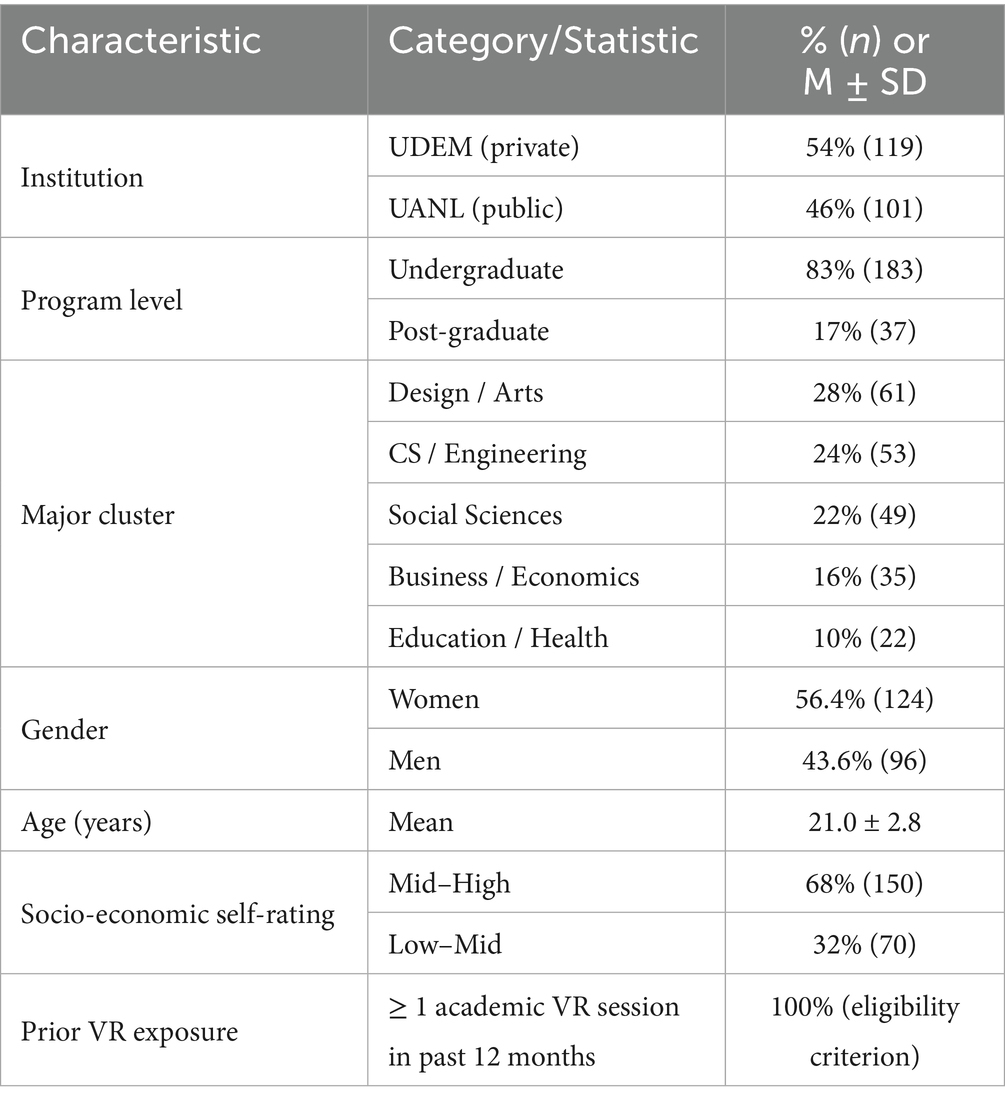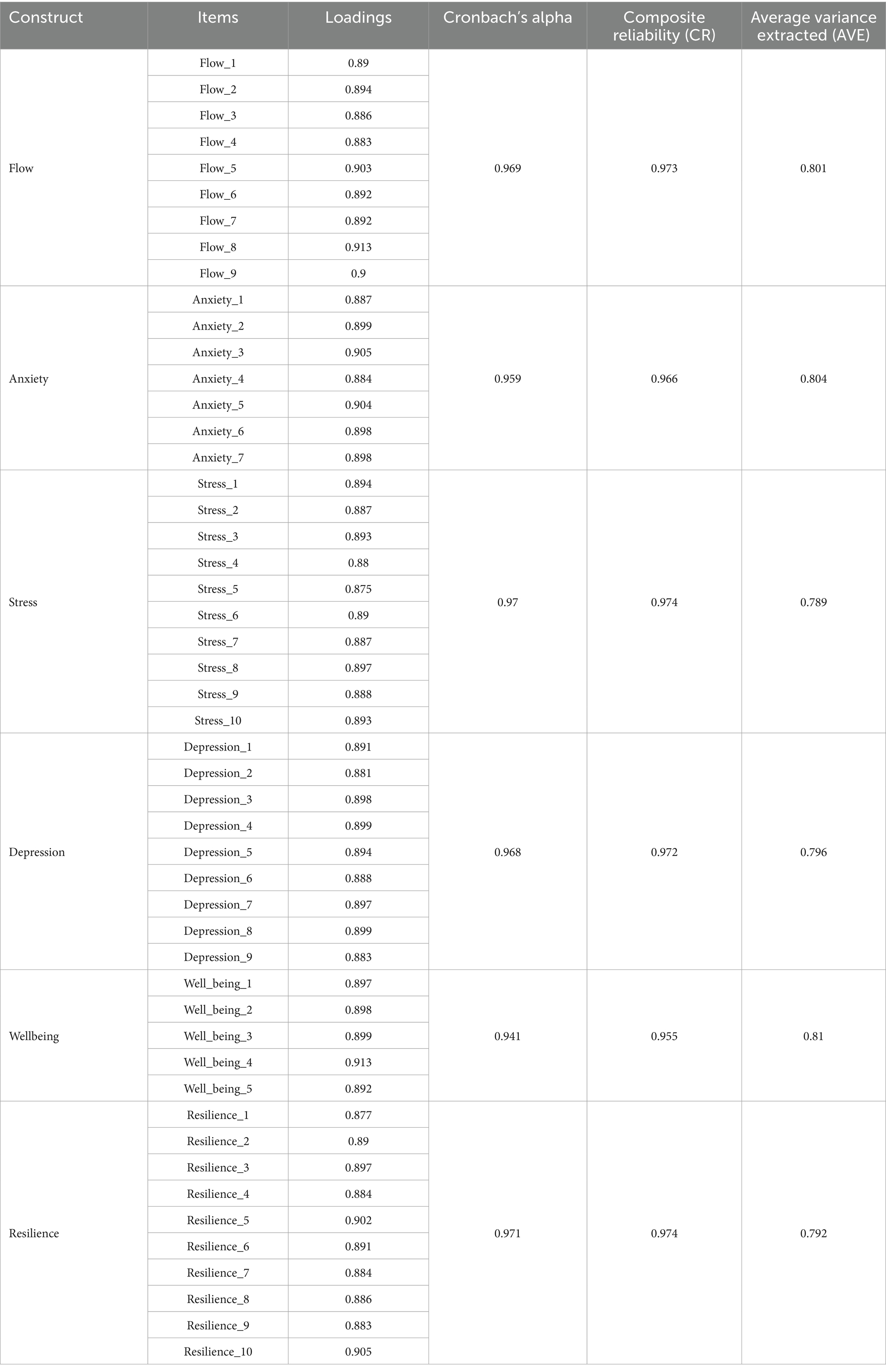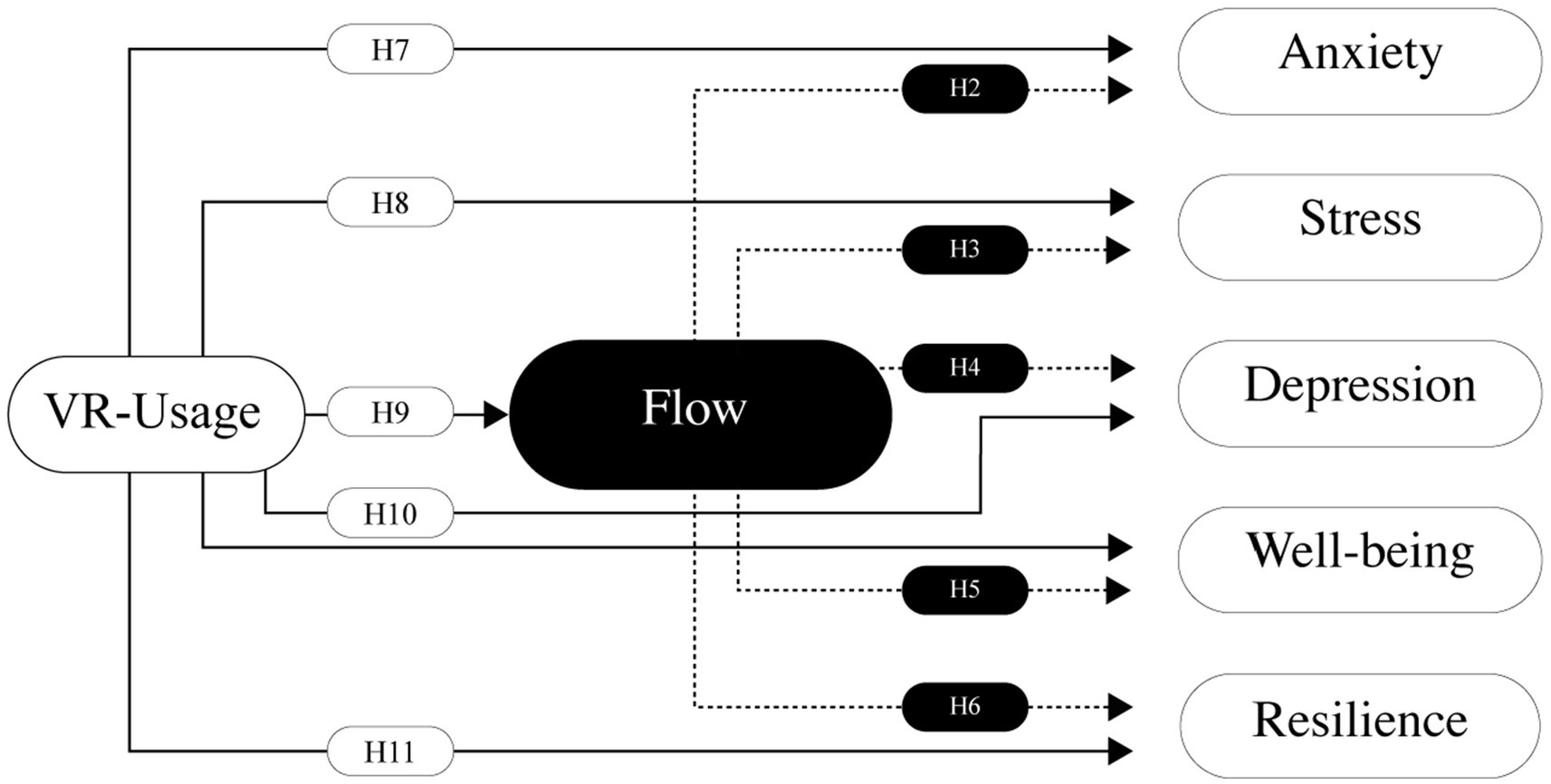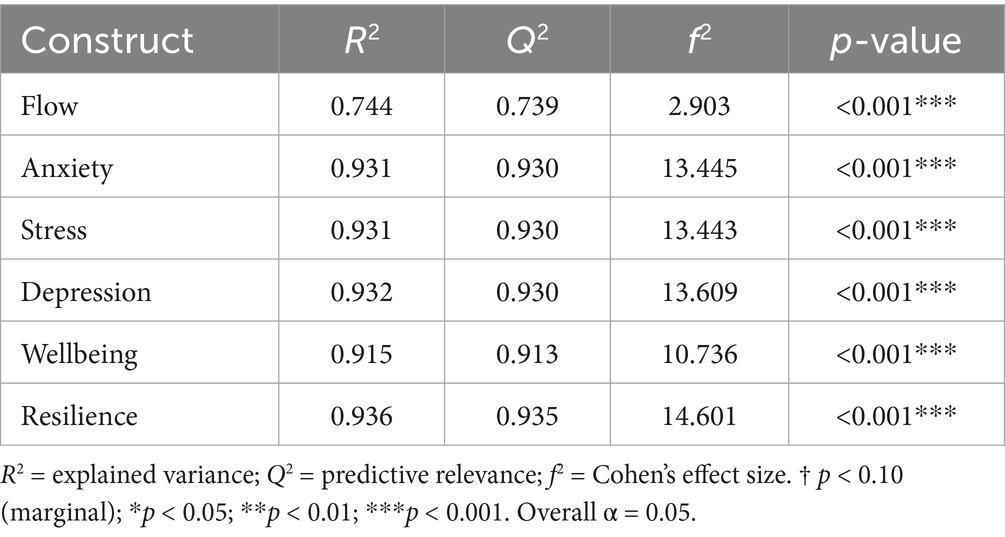- Centro Roberto Garza Sada, Art and Design Department, Universidad de Monterrey, San Pedro Garza García, Nuevo León, Mexico
The present study aims to examine the association between Virtual Reality (VR) usage in higher education and Mexican university students’ emotional resilience, and to test whether flow experiences mediate this association. A cross-sectional survey of 220 students from two Mexican universities was analyzed with Partial Least Squares Structural Equation Modelling (PLS-SEM). VR usage exhibited a direct, positive association with resilience (β = 0.45, p < 0.01), an effect that was partially transmitted through flow (indirect β = 0.30, p < 0.01). Flow fully mediated the inverse associations between VR usage and anxiety, stress, and depression, and partially mediated the positive association with wellbeing. The reflective constructs demonstrated excellent reliability (α ≥ 0.94) and convergent validity (AVE ≥ 0.79). VR usage was operationalized as a formative composite derived from two complementary indicators (prior VR exposure and gaming frequency); this specification captured technological familiarity but will benefit from further refinement in forthcoming multi-institution studies. Although the data are cross-sectional, the strength and consistency of the observed pathways provide a solid foundation for longitudinal and experimental follow-ups. Overall, the findings suggest that immersive educational designs capable of reliably eliciting flow may bolster students’ capacity to navigate post-pandemic challenges.
1 Introduction
University students around the world continue to report elevated stress, anxiety, and depression in the wake of the COVID-19 pandemic. Prolonged campus closures, the abrupt migration to remote instruction, and persistent economic uncertainty have eroded wellbeing and academic engagement (Leal Filho et al., 2021; Tasso et al., 2021). In a multi-campus survey of Mexican university students enrolled in professional degree programs, 56% screened positive for moderate-to-severe psychological distress(Sánchez et al., 2023), underscoring the need for scalable, evidence-based mental-health supports in higher education.
Immersive technologies—particularly virtual reality (VR)—have emerged as promising tools for both instructional innovation and student support. By simulating rich, interactive environments, VR can recreate laboratories, collaborative studios, or field experiences lost during lockdowns while simultaneously offering engaging spaces for social connection (Childs et al., 2023). Meta-analyses indicate that well-designed VR activities are associated with reduced anxiety and enhanced positive affect among university populations (Puente-Torre et al., 2024). Yet Latin-American evidence remains scarce, and the psychological pathways linking VR engagement to mental-health indicators are still under-explored.
Flow theory (Csikszentmihalyi et al., 1990) offers one such pathway. Flow—an optimal state of deep absorption in a challenging and intrinsically rewarding activity—has been consistently linked to higher motivation, performance, and psychological wellbeing in educational settings (Shernoff and Csikszentmihalyi, 2009). Positive-psychology perspectives, such as Fredrickson’s broaden-and-build theory, propose that repeated episodes of positive engagement accumulate into lasting personal resources, including emotional resilience (Fredrickson, 2004).
Preliminary studies suggest that immersive VR can elicit potent flow states that, in turn, reinforce students’ capacity to cope with adversity (Guerra-Tamez, 2023; Mao et al., 2024). However, empirical demonstrations remain limited, and—so far as we are aware—none have focused on Mexican university cohorts.
The present study aims to examine the association between Virtual Reality (VR) usage in higher education and Mexican university students’ emotional resilience, and to test whether flow experiences mediate this association.
2 Literature review
2.1 Virtual reality in higher education and post-pandemic wellbeing
The COVID-19 pandemic accelerated the adoption of technology in education, including a surge of interest in Virtual Reality for remote and hybrid learning (Paul et al., 2022). VR in education refers to the use of computer-generated 3D environments that students can interact with, often through head-mounted displays or similar devices, to simulate realistic learning scenarios (Concannon et al., 2019). In the post-pandemic era, educators face dual challenges: addressing learning gaps and supporting student mental health (Magorokosho et al., 2024). VR has been proposed as a solution for both. Educational VR applications range from virtual classrooms and laboratories to field trips and role-playing simulations (Alrehaili and Al Osman, 2022). These immersive experiences offer pedagogical benefits by increasing student engagement and making abstract concepts tangible.
Critically, many of the features that make VR a powerful learning tool also have implications for emotional wellbeing. Immersive VR experiences can provide social presence – the feeling of being together with others–which is particularly valuable after the social isolation many students experienced during pandemic lockdowns (Thabrew et al., 2022). By offering shared virtual spaces for collaboration, VR can mitigate feelings of isolation. Students in a virtual class can see and interact with peers’ avatars, work on group projects in a virtual environment, and even socialize informally, helping to rebuild the sense of community that is essential for mental health (Yuan and Gao, 2024). In addition, VR can serve as a form of escape or stress relief by transporting students to calming or novel environments (Bashir and Kumar, 2024). A systematic review by Simón-Vicente et al. (2024) on VR and mindfulness in university settings found that VR-based mindfulness interventions were effective in reducing anxiety and stress among students, leading to improved overall mental health (Puente-Torre et al., 2024). These interventions often leverage VR’s ability to fully engage the senses, making practices like guided meditation more vivid and focused (Seabrook et al., 2020).
Furthermore, VR has shown promise as a direct therapeutic tool for emotional wellbeing. Studies during the pandemic, such as Malighetti et al. (2023) introduced self-help VR interventions where students engaged in guided virtual experiences designed to build coping skills and positivity. Participants in these VR programs reported greater emotional wellbeing and life satisfaction post-intervention compared to control groups. While our study does not involve a controlled intervention, these findings suggest that even voluntary or academic uses of VR might carry ancillary benefits for emotional health. VR’s capacity to evoke positive emotions (awe, excitement, curiosity) and reduce negative ones (boredom, anxiety) makes it a noteworthy variable in the context of student wellbeing (Chirico et al., 2018; Quesnel and Riecke, 2018).
2.2 Flow states in education
The concept of flow was introduced by psychologist Mihály Csíkszentmihályi to describe a state of optimal experience where an individual becomes fully immersed in an activity (Csikszentmihalyi and LeFevre, 1989). In a flow state, people typically experience intense concentration, a merging of action and awareness, a loss of self-consciousness, a sense of control, distorted sense of time, and the activity feels intrinsically rewarding. In other words, one is “completely absorbed in a highly rewarding activity – and not in our inner monologues – when we feel flow” (Csikszentmihalyi and Csikszentmihalyi, 1992). Flow is often associated with activities that balance high challenge and high skill; if a task is too easy or too hard, flow is less likely to occur (S. A. Jackson et al., 2001). Within educational settings, achieving flow can be beneficial for learning and personal growth. Students in flow are deeply engaged, which can lead to better comprehension and skill acquisition (Guerra-Tamez, 2023). They may also experience enjoyment and satisfaction from learning, fostering a positive feedback loop where engagement drives success, which in turn motivates further engagement.
Research in educational psychology has examined how to facilitate flow in the classroom (Culbertson et al., 2015; Egbert, 2004; Guo and Ro, 2008; Shernoff and Csikszentmihalyi, 2009). Key factors include clear goals, immediate feedback, and a match between the task difficulty and student ability (Erhel and Jamet, 2019). When these conditions are met, students are more likely to enter flow during academic activities, whether it’s solving a challenging problem, conducting a lab experiment, or even participating in a well-designed educational game. Flow in learning has been linked to outcomes like improved academic performance, creativity, and persistence (Jinmin and Qi, 2023).
Importantly, flow is not just a cognitive state but also has affective (emotional) components (Li and Browne, 2006). The enjoyable and absorbing nature of flow can generate positive emotions during and after the activity. Students who regularly experience flow in their studies tend to report greater academic satisfaction and lower levels of study-related stress (Alp and Sungur, 2017). In a broader sense, flow can contribute to wellbeing by providing experiences of mastery and autonomy, key elements in self-determination theory (Kowal and Fortier, 1999). As one example, a study by Ljubin-Golub and Rijavec (2019) found that college students who more frequently attained flow in academic activities showed lower burnout and higher life satisfaction. Moreover, experiencing flow might help students build coping skills: by tackling challenging tasks and succeeding, students learn to manage frustration and develop a growth mindset. These skills are closely tied to resilience (Yeager and Dweck, 2012).
2.3 Linking flow to emotional resilience
The literature suggests a conceptual link between flow experiences and resilience. Emotional resilience, defined earlier as the capacity to handle stress and bounce back from adversity, can be strengthened through positive and absorbing experiences (Tugade and Fredrickson, 2004). Flow provides a break from ruminating on problems; it focuses one’s mental energy on the task at hand rather than on self-doubt or external stressors. Over time, engaging in flow-rich activities could help students develop a habit of approaching challenges with focus and confidence. From a neurological perspective, flow is associated with positive neurochemicals and reward pathways in the brain, which can reduce stress hormones and create a sense of fulfillment (Weber et al., 2016). This physiological aspect means frequent flow experiences might buffer the impact of daily stresses, thereby enhancing resilience (Van Der Linden et al., 2021).
Empirical evidence supporting the flow–resilience connection is emerging. A recent longitudinal study of Chinese university students during the COVID-19 pandemic demonstrated that students’ flow experiences predicted their wellbeing over three time points, and that psychological resilience was a key mediator in this relationship (Mao et al., 2024). In other words, flow contributed to building resilience, which in turn led to higher wellbeing. This finding resonates with the broaden-and-build theory of positive emotions (Fredrickson, 2004), which argues that positive emotional states (like the enjoyment from flow) can broaden one’s thought-action repertoires and build enduring personal resources such as resilience. On the flip side, lacking engagement (the opposite of flow) in one’s activities can lead to apathy and disengagement, which may erode coping capabilities over time (Delle Fave and Massimini, 2005).
In sum, the literature indicates that: (a) VR in education can enhance engagement and potentially wellbeing; (b) flow states are beneficial for learning and mental health; and (c) flow might serve as a bridge linking engaging educational activities to improved resilience and wellbeing. These insights form the basis for our research model, which posits that VR usage in higher education can positively influence students’ emotional resilience, and that experiencing flow during VR-enhanced learning is a crucial mediating factor. The next sections describe the methodology for testing these propositions in a cross-sectional study, followed by the results and a discussion of their implications for theory and practice.
3 Method
3.1 Design
We employed a cross-sectional, self-report survey administered online with Qualtrics during the spring semester of 2025. The study followed the ethical guidelines of the American Psychological Association and was approved by the institutional review boards of both participating universities. Analyses were conducted with Partial Least Squares Structural Equation Modelling (PLS-SEM) and complementary tests (SPSS, PROCESS macro).
3.2 Participants
After removing incomplete responses (n = 17) and cases that failed attention checks (n = 11), the final analytic sample consisted of 220 university students (see Table 1 for full demographic and academic characteristics).
Recruitment procedure. An e-mail with study information and a Qualtrics link was sent to all students by the Office of Student Affairs at each university. Two reminders were issued at one-week intervals.
Eligibility filter. On the first survey page, students confirmed (a) current enrolment and (b) at least one VR learning experience in the last 12 months (yes/no). Selecting “no” terminated the survey automatically. This filter was imposed to ensure respondents could provide experience-based ratings of VR-related flow.
Representativeness. Although the sample is non-probabilistic, it reflects the discipline mix and gender balance reported in the 2024 institutional fact books of both universities. The inclusion of one private, high-resource campus (UDEM) and one public, more resource-constrained campus (UANL) provides variability in technological access—an important contextual factor discussed in Section 5.4 (Limitations and Future Directions) (Figure 1).
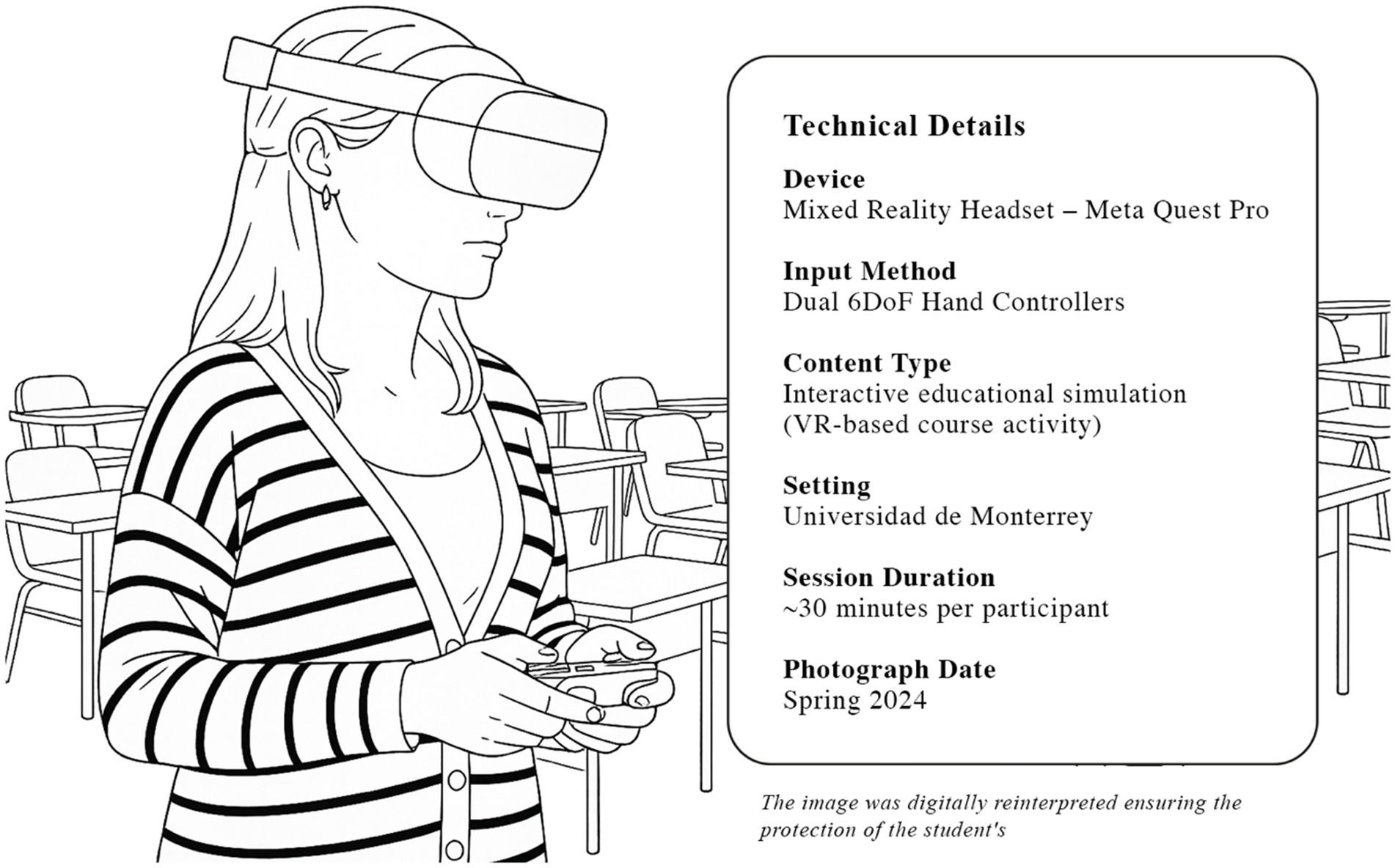
Figure 1. University student participating in a VR-enhanced educational activity using a Meta Quest Pro headset. The immersive session was part of the data collection for this study on flow and emotional resilience. The image has been digitally altered to ensure anonymity and was taken by the author during fieldwork in Spring 2024.
3.3 Instruments
3.3.1 Virtual reality usage
Students’ familiarity with immersive technology was gauged by two single-item questions:
1. Prior VR experience – “Do you have any prior experience with Virtual Reality?” (0 = No, 1 = Yes).
2. Gaming frequency – “How often do you play video games?” (1 = Never, 5 = Daily).
Both responses were z-standardized and summed to create a VRF composite; higher scores indicate greater ease with interfaces that resemble VR. The items reflect complementary facets—direct headset exposure and controller/navigation fluency—so traditional internal-consistency indices are not applicable; the construct is treated as a formative composite.
The VRF index serves as the exogenous variable labelled “VR-Usage” in the PLS-SEM model and is reported descriptively in Table 2. As expected, students answering Yes to prior VR experience also showed higher average gaming frequency (point-biserial r = 0.42), providing preliminary convergent support. We note that the measure is provisional and encourage future work to incorporate additional behavioral indicators and cross-sample validation.
3.3.2 Flow
Flow was assessed with the Flow State Scale for Educational Experiences (FSSEE, 9 items), adapted from the Flow State Scale-2 (Jackson and Marsh, 1996) and validated in Spanish higher-education contexts (Guerra-Tamez, 2023). Items represent concentration (e.g., “I felt completely focused on what I was doing”), sense of control, time distortion, and intrinsic reward, rated 1 = Strongly Disagree to 5 = Strongly Agree while thinking of the most recent VR session. Internal consistency in the present sample was excellent (α = 0.969; AVE = 0.80). Previous Mexican studies report comparable reliability (α ≥ 0.94; Guerra-Tamez, 2023).
3.3.3 Emotional resilience
Emotional resilience was measured with the Brief Resilience Scale (BRS; Smith et al., 2008). The 6 original items plus 4 culturally adapted items (10 total) assess the tendency to “bounce back” from stress (e.g., “I recover quickly after difficult times”), rated 1 = Strongly Disagree to 5 = Strongly Agree. Reliability was high (α = 0.971; AVE = 0.79). Prior Mexican validations of the 6-item form show α ≈ 0.85, supporting the scale’s robustness (Rodríguez-González et al., 2019).
3.3.4 Psychological wellbeing
Psychological wellbeing was conceptualized as life satisfaction, the cognitive component of hedonic wellbeing (Diener et al., 1985) We measured it with the Satisfaction With Life Scale (SWLS), a five-item instrument that asks respondents to evaluate their lives as a whole (e.g., “In most ways my life is close to my ideal”). Items were rated on a 5-point Likert scale (1 = Strongly Disagree, 5 = Strongly Agree). In the present sample the SWLS showed excellent internal consistency (Cronbach’s α = 0.94, CR = 0.96) and strong convergent validity (all loadings ≥ 0.89, AVE = 0.81). This operationalization captures the hedonic, cognitive facet of wellbeing that complements the affective indicators (anxiety, stress, depression) used elsewhere in the model.
3.3.5 Emotional distress
Symptoms of anxiety, stress and depression were measured with a 26-item Spanish DASS version. The scale comprises the 21 core items of the DASS-21 (Lovibond and Lovibond, 1995) plus five additional items (STR8, STR9, STR10, DEP8, DEP9) drawn from the corresponding subscales of the original DASS-42 to enhance content coverage in Mexican university populations. All items were rated from 0 (“Did not apply to me”) to 3 (“Applied most of the time”). The extended version showed excellent internal consistency in the present sample (Anxiety α = 0.959; Stress α = 0.970; Depression α = 0.968).
Although the core DASS-21 is widely validated, Mexican samples tend to score near the upper end of the stress subscale (Salinas-Rodríguez et al., 2023). To avoid ceiling effects and capture finer gradations of distress, we retained these five additional items. Future studies should examine their psychometric behaviour—e.g., via Rasch modelling—to confirm dimensional fit in university populations. In addition, cross-cultural validations across other Latin-American cohorts are needed to verify that the 26-item factorial structure and loadings remain invariant before broader regional adoption.
3.3.6 Participant profile
Seven single-item questions recorded demographic and contextual data: age (PP1, years); gender (PP2, 0 = male, 1 = female); major/field of study (PP3, recoded into five dummy categories: Design/Arts, CS/Engineering, Social Sciences, Business/Economics, Education/Health); current semester (PP4); prior VR experience beyond coursework (PP5, yes/no); weekly video-game frequency (PP6, 1 = Never, 5 = Daily); and presence of a disability relevant to VR usage (PP7, yes/no). Prior VR experience and weekly gaming frequency were subsequently combined to form the formative VR-Usage construct. Although previous work has examined links between gaming frequency and familiarity with immersive interfaces (Nagle et al., 2016) and explored possible gender-or discipline-related variations in flow (Bressler and Bodzin, 2013), the present study reports these contextual variables descriptively rather than modelling them as statistical controls in order to maintain a parsimonious structural model appropriate to the available sample size.
3.4 Procedure
Data collection was conducted online using Qualtrics during the spring semester of 2025. Participants received an invitation via institutional email, with details about the study’s purpose, confidentiality assurances, and voluntary nature. After providing informed consent, participants completed the survey in the following sequence:
1. Demographics and VR Screening–including age, gender, field of study, and VR exposure confirmation.
2. VR Usage Survey–assessing frequency, types, and immersive quality of VR-usage in educational settings.
3. Flow Scale–administered only to respondents confirming VR-usage, acknowledging possible bias toward experienced users.
4. BRS and DASS Items–administered to all participants.
5. Optional Comments–students were invited to share reflections about their VR learning experiences.
The survey took approximately 15–20 min to complete. Upon submission, participants received a debriefing page and information about entering a raffle for gift cards. To protect privacy, identifying information (e.g., emails for the raffle) was stored separately from the survey responses.
VR session parameters
• Headsets: Meta Quest Pro and Meta Quest 2, stand-alone (90 Hz, 1832 × 1920 px per eye).
• Session length: one 30-min immersive module per class (M = 29.6 min, SD = 2.4).
• Frequency: median four sessions across the semester (range = 3–6).
• Content: (a) 360° interactive lab simulations in STEM courses; (b) real-time walkthroughs of student-generated 3-D models in design studios.
• Pre-session familiarization: a 3-min on-device tutorial (guardian boundary and controller orientation) was provided before the first module to equalize baseline immersion, particularly for VR-novice students.
• Setting: ventilated multimedia lab with a 3 × 4 m clear play area; standing or seated use depending on task.
• Hygiene and safety: non-alcohol wipes and disposable face cushions between users, per institutional protocol.
3.5 Data analysis
All analyses were conducted using SPSS, the PROCESS macro (Model 4), and R for additional confirmatory modeling and model fit evaluation. Descriptive statistics and Pearson correlations were calculated to explore the relationships among the core variables: Virtual Reality (VR) use, flow, emotional resilience, wellbeing, anxiety, stress, and depression. We examined whether VR-usage was positively associated with flow, that flow would be positively related to resilience and wellbeing, and negatively related to anxiety, stress, and depression.
To test the mediation hypotheses, five separate mediation models were estimated using the PROCESS macro, with flow as the mediator between VR-usage (independent variable) and each emotional outcome (dependent variable). Specifically, the following paths were tested for each model:
Figure 2 presents the tested association (mediation) model tested in this study. It proposes that the association of VR-usage on five emotional outcomes—anxiety, stress, depression, wellbeing, and resilience—is mediated by the flow experience. Hypotheses H2 through H6 represent the indirect paths via flow, while H7 through H11 test the direct effects of VR-usage on each outcome.
To further clarify the mediation structure, Figure 3 presents the classical mediation framework. This framework illustrates the logic of decomposing total associations into direct (c′) and indirect (a × b) components using flow as a mediator.
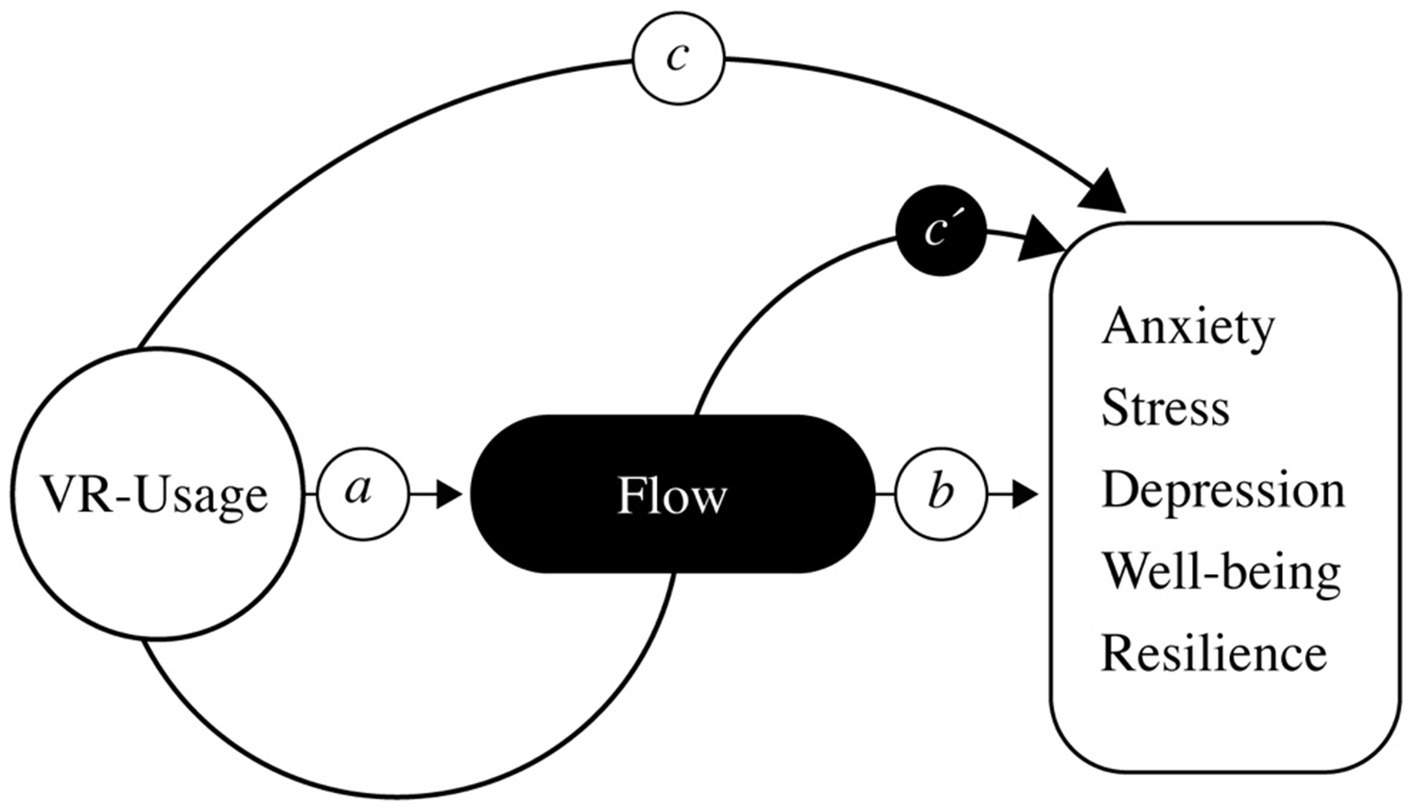
Figure 3. Mediation framework illustrating direct and indirect paths (a, b, c, c′) tested via bootstrapping. Path a: Association between VR-usage on Flow. Path b: Association between Flow on the outcome variable (Resilience, Wellbeing, Anxiety, Stress, and Depression), controlling for VR-usage. Path c: Total association between VR-usage on the outcome variable. Path c′: Direct association between VR-usage on the outcome variable, controlling for Flow.
The indirect path coefficient (a × b) was estimated using a bootstrapping approach with 5,000 resamples. Mediation was considered statistically significant if the 95% confidence interval for the indirect association did not include zero. This procedure was applied to each outcome variable individually:
1. Anxiety
2. Stress
3. Depression
4. Wellbeing
5. Resilience
In addition to mediation analysis, a one-way ANOVA was conducted to examine whether resilience scores differed significantly across students grouped by low, medium, and high VR-usage, providing an exploratory test of a potential graded association pattern.
All statistical assumptions (e.g., normality of residuals, homoscedasticity, absence of multicollinearity) were tested and met. An alpha level of 0.05 was used for all significance testing.
4 Results
4.1 Descriptive statistics
The final sample consisted of 220 students from two universities in Northeast Mexico: University of Monterrey (UDEM) and Autonomous University of Nuevo León (UANL). Of the participants, 83% were undergraduate students and 17% were enrolled in graduate programs. The sample included students from disciplines such as art and design, computer science, social sciences, and education. The mean age was 21.3 years (SD = 2.8), and all participants reported previous experience with VR in an educational or training context within the last 12 months. Gender distribution was 56.4% female and 43.6% male.
4.2 Measurement model
The measurement model was evaluated through reliability, convergent validity, and discriminant validity assessments. As shown in Table 2, all constructs demonstrated excellent reliability, with Cronbach’s alpha values ranging from 0.941 to 0.971, composite reliability (CR) values between 0.955 and 0.974, and average variance extracted (AVE) values exceeding the recommended threshold of 0.50.
Discriminant validity was confirmed via the Fornell–Larcker criterion. Table 3 shows that the square root of each construct’s AVE was greater than its correlations with any other construct. The strongest correlation was between resilience and depression (r ≈ 0.82), yet AVE criteria were still met. HTMT analysis yielded no violations of discriminant validity.
4.3 Interconstruct correlations
As presented in Table 4, interconstruct correlations confirmed expected patterns. VR-usage was positively correlated with flow (r = 0.783), and both were positively associated with resilience (r = 0.837 and r = 0.849, respectively) and wellbeing (r = 0.694 and r = 0.716, respectively). In contrast, negative correlations were observed between VR-usage and anxiety (r = −0.773), stress (r = −0.747), and depression (r = −0.719), as well as between flow and these same negative outcomes.
4.4 Structural model and hypothesis testing
The structural model was estimated using PLS-SEM with 5,000 bootstrap resamples. Table 5 and Figure 4 summarizes all 11 hypotheses tested. Results indicated that VR-usage significantly predicted flow (H1: β = 0.783, t = 22.503, p < 0.001). Flow had significant negative associations on anxiety (H2: β = −0.830, t = 21.004, p < 0.001), stress (H3: β = −0.803, t = 19.706, p < 0.001), and depression (H4: β = −0.681, t = 14.429, p < 0.001). Flow also significantly predicted wellbeing (H5: β = 0.716, t = 17.016, p < 0.001) and resilience (H6: β = 0.849, t = 28.163, p < 0.001).
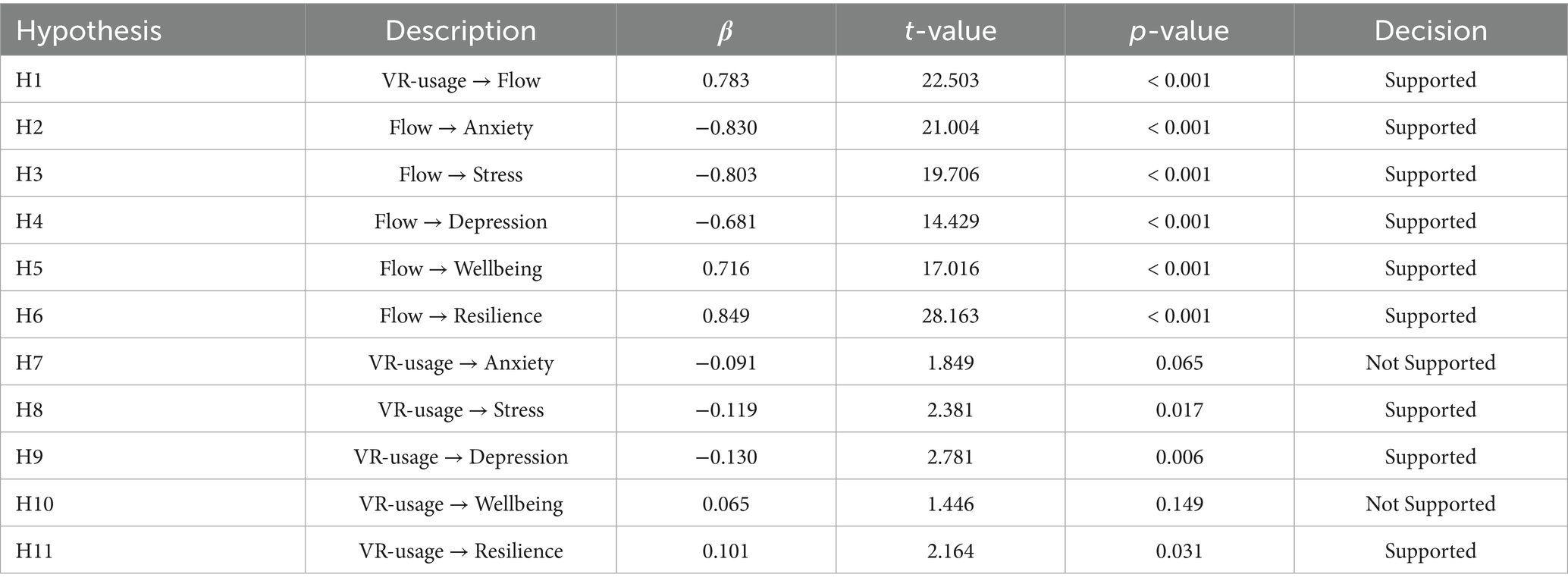
Table 5. Results of the structural model: path coefficients (β), t-values, p-values, and hypothesis decisions based on 5,000 bootstrap samples.
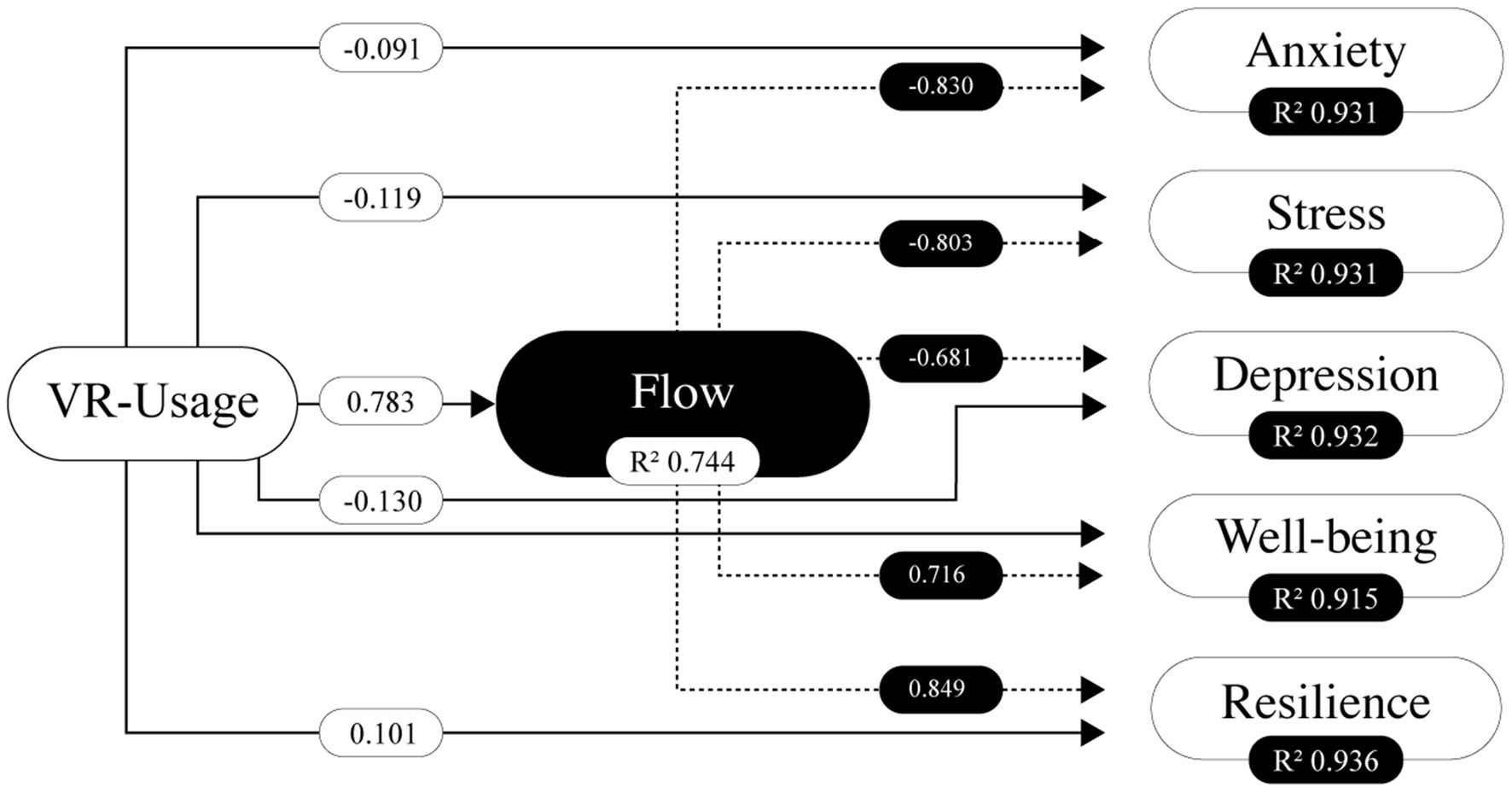
Figure 4. Structural model illustrating the relationships between VR-usage, flow, and emotional outcomes. Standardized path coefficients (β) are shown for each path. Explained variance (R2) is displayed inside the target constructs. Solid arrows indicate statistically significant paths (p < 0.05), and dashed arrows represent non-significant relationships.
Regarding direct associations of VR-usage on emotional outcomes, VR-usage significantly predicted stress (H8: β = −0.119, t = 2.381, p = 0.017), depression (H9: β = −0.130, t = 2.781, p = 0.006), and resilience (H11: β = 0.101, t = 2.164, p = 0.031). However, it did not significantly predict anxiety (H7: β = −0.091, t = 1.849, p = 0.065) or wellbeing (H10: β = 0.065, t = 1.446, p = 0.149).
4.4.1 ANOVA results: dose–response relationship
To further explore the relationship between VR-usage and emotional resilience, a one-way ANOVA was conducted to examine whether resilience scores differed significantly between students with low versus high levels of VR-usage. The analysis yielded statistically significant results, F(1, 218) = 10.87, p < 0.001, indicating a substantial group difference.
Specifically, students categorized as high VR users reported significantly higher mean resilience scores (M = 0.38, SD = 0.45), while low VR users had substantially lower mean scores (M = −1.53, SD = 0.45). This result suggests that students with low exposure to immersive VR environments showed markedly diminished emotional coping capacity—over one and a half standard deviations below the sample mean—whereas high VR users exhibited more adaptive resilience levels.
The association size, calculated using eta squared (η2 = 0.047), indicates a moderate practical impact of VR-usage on emotional resilience. This dose–response pattern aligns with the theoretical framework of the study, which posits that higher engagement in immersive technologies may enhance flow states and strengthen psychological resources.
Although multiple emotional outcomes were modeled in the structural equation framework, resilience was selected for this post hoc analysis due to its theoretical centrality in the model and its role as a key outcome mediated by flow. These findings reinforce the idea that regular use of VR in educational contexts may meaningfully enhance students’ capacity to cope with post-pandemic challenges.
As illustrated in Figure 5, students with high VR-usage demonstrated significantly higher mean resilience scores (M = 0.38, SD = 0.45) compared to those with low VR-usage (M = −1.53, SD = 0.45), supporting a dose–response pattern.
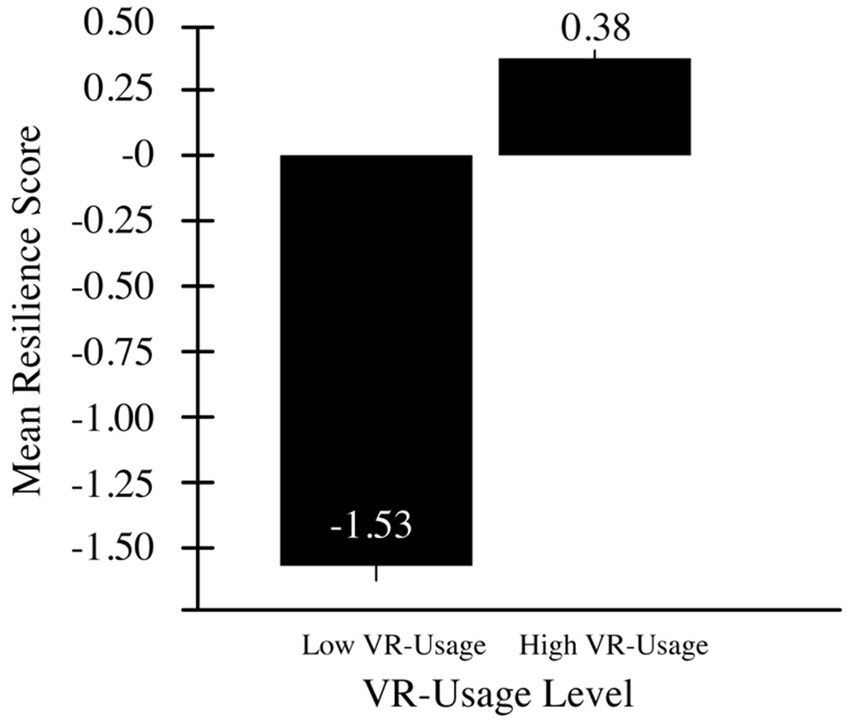
Figure 5. Emotional resilience scores by VR-usage level. Students with high VR-usage reported significantly greater resilience than those with low VR-usage. Error bars represent standard error.
The model demonstrated strong explanatory and predictive power (Table 6). R2 values ranged from 0.744 (Flow) to 0.936 (Resilience), indicating substantial variance explained, while Q2 values confirmed high out-of-sample predictive relevance.
Predictive relevance was evaluated using the blindfolding procedure. All Q2 values exceeded the recommended threshold of 0.35, supporting the model’s predictive accuracy: flow (Q2 = 0.739), resilience (Q2 = 0.935), anxiety (Q2 = 0.930), stress (Q2 = 0.930), depression (Q2 = 0.930), and wellbeing (Q2 = 0.913).
Association size estimates (f2) were also calculated to assess the substantive impact of each predictor. Large association sizes were observed for the influence of flow on resilience (f2 = 14.601), anxiety (f2 = 13.445), stress (f2 = 13.443), depression (f2 = 13.609), and wellbeing (f2 = 10.736). The association size of VR-usage on flow was moderate (f2 = 2.903), underscoring the central role of flow as a psychological mediator.
4.5 Association sizes (f2)
Association sizes were calculated to assess the magnitude of individual path contributions. Flow showed large association sizes on resilience (f2 = 14.601), anxiety (f2 = 13.445), stress (f2 = 13.443), depression (f2 = 13.609), and wellbeing (f2 = 10.736). These values indicate that flow plays a central role in mediating the impact of VR-usage on emotional outcomes.
4.6 Global model fit
Global model fit was assessed with the Standardized Root-Mean-Square Residual (SRMR), d_ULS, d_G, and the Normed Fit Index (NFI). As shown in Table 7, all indices fell within recommended thresholds (SRMR = 0.062, d_ULS = 0.944, d_G = 0.587, NFI = 0.935), indicating good overall model fit.
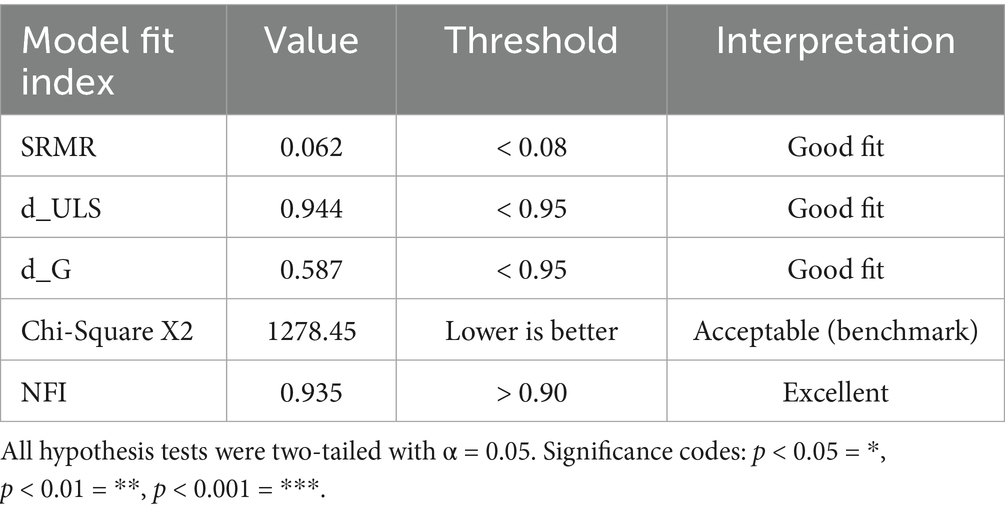
Table 7. Global model fit indices: SRMR, d_ULS, d_G, and NFI values supporting overall model adequacy.
4.7 Mediation analysis
Mediation associations were tested using bootstrapped confidence intervals. Flow significantly mediated the relationships between VR-usage and several outcomes. For resilience, flow served as a complementary (partial) mediator (β indirect = 0.667, p < 0.001) since both the direct (VR → Resilience) and indirect paths (VR → Flow → Resilience) were significant. A similar pattern was observed for wellbeing (β indirect = 0.693, p < 0.001).
For anxiety, stress, and depression, the direct associations of VR-usage were not significant, but the indirect associations through flow were (anxiety: β indirect = −0.678, p < 0.001; stress: β indirect = −0.650, p < 0.001; depression: β indirect = −0.646, p < 0.001), suggesting indirect-only mediation.
Table 8 summarizes the results of the mediation analysis, including indirect, direct, and total associations, and the mediation type.
4.8 Exploratory subgroup check
To examine whether prior video-game familiarity influenced the core pathways, we split the sample at the median of gaming-frequency (Low gamers = 1–3; High gamers = 4–5). Independent-samples t tests revealed small but significant differences:
Flow: t(218) = 2.14, p = 0.034, Cohen’s d = 0.29
Resilience: t(218) = 1.99, p = 0.048, d = 0.26
High gamers reported marginally higher flow (M = 4.12) and resilience (M = 4.05) than low gamers (M = 3.93 and 3.92, respectively). While effect sizes are small, the pattern suggests that video-game familiarity may slightly potentiate the VR → Flow → Resilience pathway.
4.9 Qualitative insights
Twenty-two students (10%) left open-ended remarks. Seventeen expressed clearly positive impressions, four were neutral or purely descriptive, and one raised a mild concern about motion sickness. Thematic coding revealed two recurring ideas: (a) VR made “complex topics feel real,” and (b) immersive tasks “pushed me to concentrate so hard that time flew by,” echoing the high quantitative flow scores. Even the single critical comment noted that VR sessions provided “a mental break from daily stress, like a mini vacation,” underscoring the overall favorable tone.
5 Discussion
The present study aims to examine the association between Virtual Reality (VR) usage in higher education and Mexican university students’ emotional resilience, and to test whether flow experiences mediate this association. Section 5 is organized around the proposed mediation model: we first summarize the direct associations between VR usage and psychological outcomes, then report the indirect paths mediated by flow, and finally comment on the overall explanatory power and limitations of the model. All 11 hypotheses (H1–H11) were evaluated against the study’s dual objective: (a) to determine whether the frequency of VR use predicts key emotional outcomes and (b) to test flow as an explanatory mechanism. Results in Table 5 show that H1H6 were fully supported, confirming past work that immersive VR elicits robust flow (Parong and Mayer, 2018) and that flow, in turn, broadens resources and lowers distress (Mao et al., 2024; Tugade and Fredrickson, 2004). H8, H9 and H11 received modest support, aligning with small direct associations reported in earlier university samples (Tai et al., 2022). Conversely, H7 and H10 were not supported, reinforcing meta-analytic evidence that mere exposure to VR seldom reduces anxiety or boosts wellbeing unless deep engagement is achieved (O. Kim et al., 2019). Bootstrapped indirect paths (Section 4.8) verified flow as a complementary or sole mediator in every model, thereby meeting objective (b). Collectively, these findings demonstrate that the study’s overarching aim was met: VR fosters post-pandemic resilience chiefly through the quality of flow, not through exposure alone.
5.1 Interpretation of findings
Our findings suggest that VR usage contributes to higher levels of resilience in Mexican university students during the post-pandemic period, aligning with previous research that underscores VR’s potential benefits for mental wellbeing and academic engagement (N. Kim and Lee, 2021; Wang et al., 2022). As depicted in Figure 5, VR-usage exerts a direct association on stress, depression, and resilience but does not significantly predict anxiety or wellbeing when considered independently. Instead, flow emerges as a key explanatory mechanism: while VR itself has direct benefits, the quality of immersion and focused absorption (i.e., flow) amplifies these associations (Csikszentmihalyi, 1990). In particular, the strong path from VR-usage to flow (β = 0.783) indicates that more frequent or skill-matched VR experiences are likely to induce deeper engagement—potentially reducing negative emotional states and bolstering psychological resources.
5.2 Comparisons with prior studies
Consistent with Tai et al. (2022), who found that VR can reduce anxiety and promote deeper learning, our results extend these benefits to the domain of resilience. Crucially, the partial mediating role of flow helps explain why VR might bolster resilience: immersive, highly engaging scenarios foster a deep-focus state that, in turn, lowers stress and depressive symptoms while enhancing positive outcomes.
Our findings also illuminate discrepancies noted by Kim et al. (2019), who reported only small-to-medium associations between VR and wellbeing. One plausible reason is that earlier studies employed less frequent or lower-quality immersive experiences, dampening effects. By contrast, participants in our sample engaged with VR in high-fidelity, task-relevant ways, which may account for the stronger relationships observed.
Contextual factors may further shape the VR–flow–resilience interplay. In Mexico, private universities with robust technological infrastructures can offer frequent, high-quality VR sessions that deepen engagement, whereas public or rural campuses often face equipment shortages or overcrowded labs, conditions that blunt immersion and flow. Cultural values rooted in collectivism and strong family support (familismo) can buffer stress independently of VR use, potentially moderating our associations (Campos et al., 2018). Such collective orientations may also shape students’ subjective engagement with VR; for example, learners who prize group harmony could experience deeper flow in collaborative VR tasks than in solitary scenarios, whereas highly individual sessions may offer a weaker challenge–skill balance. Descriptive checks revealed no significant gender differences in VR usage, flow, or resilience (all |t| < 1.30, p > 0.19), echoing evidence that gender plays only a minor role in technology-enhanced flow experiences (Bressler and Bodzin, 2013). A small exploratory effect of gaming familiarity on flow and resilience (section 4.9) aligns with evidence that practice navigating digital environments can ease immersion (Nagle et al., 2016) although the effect size (d ≈ 0.26) is unlikely to account for the robust pathways observed. Future research with larger, more balanced samples could test gender formally—as well as cultural value orientations (e.g., collectivism–individualism indices) and family climate—as moderators of the VR → Flow → Resilience pathway.
Finally, attitudes that frame digital tools as gateways to upward social mobility may amplify both flow and resilience, whereas cultural scripts that discourage overt displays of distress could lead students to under-report negative affect, partially inflating observed links. Multisite studies across varied Mexican regions—and cross-cultural comparisons in Latin America—should therefore incorporate such sociocultural metrics when modelling the VR–flow–resilience relationship.
Descriptive checks revealed no significant gender differences in VR usage, flow, or resilience (all |t| < 1.30, p > 0.19), echoing evidence that gender plays only a minor role in technology-enhanced flow experiences (Bressler and Bodzin, 2013). A small exploratory effect of gaming familiarity on flow and resilience (section 4.9) aligns with evidence that practice navigating digital environments can ease immersion (Nagle et al., 2016) although the effect size (d ≈ 0.26) is unlikely to account for the robust pathways observed and—even though the effect is small—this finding underscores that baseline technological familiarity may be a practical design factor when deploying VR in classrooms where video-game exposure is limited. Future research with larger, more balanced samples could test gender formally—as well as cultural value orientations (e.g., collectivism–individualism indices) and family climate—as moderators of the VR → Flow → Resilience pathway.
5.3 Theoretical and practical implications
Theoretically, these findings extend the application of flow theory to a post-pandemic resilience framework, illustrating how technologically induced flow can reinforce psychological resources beyond academic performance (Jackson et al., 1998). The model shown in Figure 5 underscores that flow not only mitigates negative emotional states (e.g., stress, depression) but also elevates positive indicators such as resilience.
From a practical perspective, institutions that wish to turn this mechanism into action can begin with pilot-level activities that embed a brief VR experience plus a structured reflection on coping strategies—without adding credit hours or major budget outlays. Three illustrative options are:
1. Design / Architecture studios–immersive critique. Replace one conventional pin-up with a 10-min VR walk-through of students’ 3-D models (e.g., Sketchfab via low-cost headsets). Immersion raises challenge–skill balance, while a short debrief helps students link that flow experience to resilience skills.
2. Teacher-education workshops–360° classroom sandbox. Trainees view and interact with a short 360° classroom-management scenario, then discuss how the immersive perspective affected stress appraisal and problem-solving.
3. Health-science simulations–VR code-blue vignette. Nursing or medical students observe a publicly available VR resuscitation clip and immediately reflect on emotion regulation under time pressure.
These scenarios align with the ANUIES 2023, Digital Competence Framework for Mexican higher education, which encourages low-threshold adoption of immersive tools (Ponce López et al., 2022), and they echo international reviews that highlight AR/VR’s potential to enhance engagement in distance or hybrid learning (Childs et al., 2023). Pilot implementation will allow instructors to evaluate feasibility, student acceptance, and the extent to which flow-inducing VR moments can be systematically leveraged to strengthen emotional resilience across disciplines.
5.4 Limitations and future directions
While the study offers valuable evidence on VR, flow, and resilience in a Latin-American higher-education context, several methodological considerations warrant attention.
First, because the data are cross-sectional, the observed associations should be interpreted as non-causal; longitudinal or experimental designs could clarify temporal ordering.
Second, by restricting the sample to students with at least minimal VR exposure we enhanced the ecological validity of self-reports, but this criterion may have attracted participants with higher digital literacy and more positive attitudes toward immersive technology. Broadening recruitment to VR-novice students and lower-resource institutions will test the generalizability of our findings and help counter any self-selection bias that could inflate favorable perceptions of VR. Future studies might, for instance, offer a short headset-induction session and use stratified sampling to guarantee that participants with zero prior VR experience are proportionally represented, especially on campuses with limited technological access.
Third, VR use was captured with a single self-report item; although adequate for this exploratory model, a multi-item scale that assesses frequency, context, and immersion would permit stronger reliability and validity checks.
Fourth, the exclusive use of self-report instruments raises the possibility of common-method variance; subsequent studies could triangulate behavioral logs and physiological indicators of immersion or stress.
Fifth, although the DASS-21 showed excellent reliability, future work might switch to a validated ultra-short form (e.g., DASS-12) or use item-reduction techniques to curb participant fatigue while preserving construct validity.
Finally, while socioeconomic status, academic field, gaming frequency, and mindfulness practice were entered as covariates, we did not explore them as moderators; multigroup or hierarchical models could reveal nuanced subgroup patterns. Although gaming frequency showed only a small association with flow and resilience, larger samples and formal multigroup SEM are needed to test gaming expertise as a potential moderator of the full VR → Flow → Resilience pathway.
6 Conclusion
The present study aims to examine the association between Virtual Reality (VR) usage in higher education and Mexican university students’ emotional resilience, and to test whether flow experiences mediate this association. These findings suggest that the immersive and engaging nature of VR can reinforce students’ adaptive capacities by fostering deep involvement and satisfaction during virtual experiences. By positioning flow as a central psychological mechanism, the present research contributes to theoretical models linking immersive technologies with mental wellbeing. These results highlight the importance of designing VR-based interventions that aim not only at educational outcomes but also at enhancing emotional resilience. Future research should examine the long-term and cross-cultural associations of VR on psychological adaptation and explore additional mediators and moderators that may shape this relationship. It will also be valuable to investigate how VR influences other dimensions of student wellbeing—such as sense of belonging, academic motivation, and self-efficacy—particularly in culturally diverse populations.
Data availability statement
The raw data supporting the conclusions of this article will be made available by the authors, without undue reservation.
Ethics statement
The studies involving humans were approved by Universidad de Monterrey Ethics Committee. The studies were conducted in accordance with the local legislation and institutional requirements. The participants provided their written informed consent to participate in this study. Written informed consent was obtained from the individual(s) for the publication of any potentially identifiable images or data included in this article.
Author contributions
CG-T: Conceptualization, Supervision, Writing – review & editing, Investigation, Methodology, Software, Formal analysis, Visualization, Funding acquisition, Project administration, Writing – original draft, Data curation, Resources, Validation.
Funding
The author(s) declare that financial support was received for the research and/or publication of this article. This study was supported by the UDEM Award 40021.
Conflict of interest
The author declares that the research was conducted in the absence of any commercial or financial relationships that could be construed as a potential conflict of interest.
Generative AI statement
The authors declare that no Gen AI was used in the creation of this manuscript.
Publisher’s note
All claims expressed in this article are solely those of the authors and do not necessarily represent those of their affiliated organizations, or those of the publisher, the editors and the reviewers. Any product that may be evaluated in this article, or claim that may be made by its manufacturer, is not guaranteed or endorsed by the publisher.
Supplementary material
The Supplementary material for this article can be found online at: https://www.frontiersin.org/articles/10.3389/feduc.2025.1618968/full#supplementary-material
References
Alp, A., and Sungur, S. (2017). Investigating relationships between undergraduate students’ flow experience, academic procrastination behavior, and calculus course achievement. Eurasian J. Educ. Res. 17, 1–22. Available at: https://dergipark.org.tr/en/pub/ejer/issue/42492/511820
Alrehaili, E. A., and Al Osman, H. (2022). A virtual reality role-playing serious game for experiential learning. Interact. Learn. Environ. 30, 922–935. doi: 10.1080/10494820.2019.1703008
Bashir, S., and Kumar, S. (2024). Innovative approaches to stress reduction: a review of virtual reality therapy in university-going students: stress reduction approaches. Pak. J. Health Sci. 5, 259–267. doi: 10.54393/pjhs.v5i08.1950
Bressler, D. M., and Bodzin, A. M. (2013). A mixed methods assessment of students’ flow experiences during a mobile augmented reality science game. J. Comput. Assist. Learn. 29, 505–517. doi: 10.1111/jcal.12008
Campos, B., Yim, I. S., and Busse, D. (2018). Culture as a pathway to maximizing the stress-buffering role of social support. Hispanic J. Behav. Sci. 40, 294–311. doi: 10.1177/0739986318772490
Childs, E., Mohammad, F., Stevens, L., Burbelo, H., Awoke, A., Rewkowski, N., et al. (2023). An overview of enhancing distance learning through emerging augmented and virtual reality technologies. IEEE Trans. Vis. Comput. Graph. 4480–4496. doi: 10.1109/TVCG.2023.3264577
Chirico, A., Ferrise, F., Cordella, L., and Gaggioli, A. (2018). Designing awe in virtual reality: an experimental study. Front. Psychol. 8:2351. doi: 10.3389/fpsyg.2017.02351
Concannon, B. J., Esmail, S., and Roduta Roberts, M. (2019). Head-mounted display virtual reality in post-secondary education and skill training. Front. Educ. 4:80. doi: 10.3389/feduc.2019.00080
Csikszentmihalyi, M., and Csikszentmihalyi, I. S. (Eds.). (1992). Optimal experience: Psychological studies of flow in consciousness. Cambridge University Press.
Csikszentmihalyi, M., and LeFevre, J. (1989). Optimal experience in work and leisure. J. Pers. Soc. Psychol. 56, 815–822. doi: 10.1037/0022-3514.56.5.815
Culbertson, S. S., Fullagar, C. J., Simmons, M. J., and Zhu, M. (2015). Contagious flow: antecedents and consequences of optimal experience in the classroom. J. Manage. Educ. 39, 319–349. doi: 10.1177/1052562914545336
Delle Fave, A., and Massimini, F. (2005). The investigation of optimal experience and apathy: developmental and psychosocial implications. Eur. Psychol. 10, 264–274. doi: 10.1027/1016-9040.10.4.264
Diener, E. D., Emmons, R. A., Larsen, R. J., and Griffin, S. (1985). The satisfaction with life scale. J. Pers. Assess. 49, 71–75. doi: 10.1207/s15327752jpa4901_13
Egbert, J. (2004). A study of flow theory in the foreign language classroom. Can. Mod. Lang. Rev. 60, 549–586. doi: 10.3138/cmlr.60.5.549
Erhel, S., and Jamet, E. (2019). Improving instructions in educational computer games: exploring the relations between goal specificity, flow experience and learning outcomes. Comput. Human Behav. 91, 106–114. doi: 10.1016/j.chb.2018.09.020
Fredrickson, B. L. (2004). The broaden–and–build theory of positive emotions. Philos. Trans. R. Soc. Lond. B Biol. Sci. 359, 1367–1377. doi: 10.1098/rstb.2004.1512
Guerra-Tamez, C. R. (2023). The impact of immersion through virtual reality in the learning experiences of art and design students: the mediating effect of the flow experience. Educ. Sci. 13:185. doi: 10.3390/educsci13020185
Guo, Y. M., and Ro, Y. K. (2008). Capturing flow in the business classroom. Decis. Sci. J. Innov. Educ. 6, 437–462. doi: 10.1111/j.1540-4609.2008.00185.x
Jackson, S., Kimiecik, J., Ford, S., and Marsh, H. (1998). Psychological correlates of flow in sport. J. Sport Exerc. Psychol. 20, 358–378. doi: 10.1123/jsep.20.4.358
Jackson, S. A., and Marsh, H. W. (1996). Development and validation of a scale to measure optimal experience: the flow state scale. J. Sport Exerc. Psychol. 18, 17–35. doi: 10.1123/jsep.18.1.17
Jackson, S. A., Thomas, P. R., Marsh, H. W., and Smethurst, C. J. (2001). Relationships between flow, self-concept, psychological skills, and performance. J. Appl. Sport Psychol. 13, 129–153. doi: 10.1080/104132001753149865
Jinmin, Z., and Qi, F. (2023). Relationship between learning flow and academic performance among students: a systematic evaluation and meta-analysis. Front. Psychol. 14:1270642. doi: 10.3389/fpsyg.2023.1270642
Kim, N., and Lee, H. (2021). Assessing consumer attention and arousal using eye-tracking technology in virtual retail environment. Front. Psychol. 12:665658. doi: 10.3389/fpsyg.2021.665658
Kim, O., Pang, Y., and Kim, J.-H. (2019). The effectiveness of virtual reality for people with mild cognitive impairment or dementia: a meta-analysis. BMC Psychiatry 19, 1–10. doi: 10.1186/s12888-019-2180-x
Kowal, J., and Fortier, M. S. (1999). Motivational determinants of flow: contributions from self-determination theory. J. Soc. Psychol. 139, 355–368. doi: 10.1080/00224549909598391
Leal Filho, W., Wall, T., Rayman-Bacchus, L., Mifsud, M., Pritchard, D. J., Lovren, V. O., et al. (2021). Impacts of COVID-19 and social isolation on academic staff and students at universities: a cross-sectional study. BMC Public Health 21:1213. doi: 10.1186/s12889-021-11040-z
Li, D., and Browne, G. J. (2006). The role of need for cognition and mood in online flow experience. J. Comput. Inf. Syst. 46, 11–17.
Ljubin-Golub, T., and Rijavec, M. (2019). Academic flow and burnout in college students: an eight-month longitudinal study. Eur. Proceed. Soc. Behav. Sci.
Lovibond, P. F., and Lovibond, S. H. (1995). The structure of negative emotional states: comparison of the depression anxiety stress scales (DASS) with the Beck depression and anxiety inventories. Behav. Res. Ther. 33, 335–343. doi: 10.1016/0005-7967(94)00075-U
Magorokosho, N. K., Heraclides, A., Papaleontiou-Louca, E., and Prodromou, M. (2024). Evaluation of resilience and mental health in the “post-pandemic era” among university students: protocol for a mixed-methods study. Int. J. Environ. Res. Public Health 21:825. doi: 10.3390/ijerph21070825
Malighetti, C., Schnitzer, C. K., YorkWilliams, S. L., Bernardelli, L., Runfola, C. D., Riva, G., et al. (2023). A pilot multisensory approach for emotional eating: pivoting from virtual reality to a 2-D telemedicine intervention during the COVID-19 pandemic. J. Clin. Med. 12:7402. doi: 10.3390/jcm12237402
Mao, Y., Luo, X., Wang, S., Mao, Z., Xie, M., and Bonaiuto, M. (2024). Flow experience fosters university students’ well-being through psychological resilience: a longitudinal design with cross-lagged analysis. Br. J. Educ. Psychol. 94, 518–538. doi: 10.1111/bjep.12661
Nagle, A., Wolf, P., and Riener, R. (2016). Towards a system of customized video game mechanics based on player personality: relating the big five personality traits with difficulty adaptation in a first-person shooter game. Entertain. Comput. 13, 10–24. doi: 10.1016/j.entcom.2016.01.002
Parong, J., and Mayer, R. E. (2018). Learning science in immersive virtual reality. J. Educ. Psychol. 110:785. doi: 10.1037/edu0000241
Paul, I., Mohanty, S., and Sengupta, R. (2022). The role of social virtual world in increasing psychological resilience during the on-going COVID-19 pandemic. Comput. Hum. Behav. 127:107036. doi: 10.1016/j.chb.2021.107036
Ponce López, J. L., Vicario Solórzano, C. M., and y López Valencia, F. (Coords.). (2022). Estado actual de las Tecnologías Educativas en las Instituciones de Educación Superior en México. Estudio 2023 México: Asociación Nacional de Universidades e Instituciones de Educación Superior.
Puente-Torre, P., Delgado-Benito, V., Rodríguez-Cano, S., and García-Delgado, M. Á. (2024). Estado actual de las tecnologías educativas en las IES en México. Estudio 2022. Multimodal Technol. Interact. 8:89. doi: 10.3390/mti8100089
Quesnel, D., and Riecke, B. E. (2018). Are you awed yet? How virtual reality gives us awe and goose bumps. Front. Psychol. 9:2158. doi: 10.3389/fpsyg.2018.02158
Rodríguez-González, M., Schweer-Collins, M., Skowron, E. A., Jódar, R., Cagigal, V., and Major, S. O. (2019). Stressful life events and physical and psychological health: mediating effects of differentiation of self in a Spanish sample. J. Marital. Fam. Ther. 45, 578–591. doi: 10.1111/jmft.12358
Salinas-Rodríguez, A., Argumedo, G., Hernández-Alcaraz, C., Contreras-Manzano, A., and Jáuregui, A. (2023). Depression, anxiety, and stress scale: factor validation during the first COVID-19 lockdown in Mexico. Rev. Latinoam. Psicol. 55, 83–90. doi: 10.14349/rlp.2023.v55.10
Sánchez, D. P. G., Cabrera, R. S., Rubio, V. I., and Comonfort, A. M. (2023). Perceived academic stress in Mexican medical students. The role of sex emotional distress, burnout, academic-social support, current abuse experiences, and coping strategies. Salud Ment. 46, 155–163. doi: 10.17711/SM.0185-3325.2023.020
Seabrook, E., Kelly, R., Foley, F., Theiler, S., Thomas, N., Wadley, G., et al. (2020). Understanding how virtual reality can support mindfulness practice: mixed methods study. J. Med. Internet Res. 22:e16106. doi: 10.2196/16106
Shernoff, D. J., and Csikszentmihalyi, M. (2009). “Flow in schools: cultivating engaged learners and optimal learning environments” in Handbook of Positive Psychology in Schools (Routledge), 131–146.
Simón-Vicente, L., Rodríguez-Cano, S., Delgado-Benito, V., Ausín-Villaverde, V., and Delgado, E.C. (2024). Cybersickness. A systematic literature review of adverse effects related to virtual reality. Neurología. 39, 701–709.
Smith, B. W., Dalen, J., Wiggins, K., Tooley, E., Christopher, P., and Bernard, J. (2008). The brief resilience scale: assessing the ability to bounce back. Int. J. Behav. Med. 15, 194–200. doi: 10.1080/10705500802222972
Tai, K.-H., Hong, J.-C., Tsai, C.-R., Lin, C.-Z., and Hung, Y.-H. (2022). Virtual reality for car-detailing skill development: learning outcomes of procedural accuracy and performance quality predicted by VR self-efficacy, VR using anxiety, VR learning interest and flow experience. Comput. Educ. 182:104458. doi: 10.1016/j.compedu.2022.104458
Tasso, A. F., Hisli Sahin, N., and San Roman, G. J. (2021). COVID-19 disruption on college students: academic and socioemotional implications. Psychol. Trauma Theory Res. Pract. Policy 13, 9–15. doi: 10.1037/tra0000996
Thabrew, H., Chubb, L. A., Kumar, H., and Fouché, C. (2022). Immersive reality experience technology for reducing social isolation and improving social connectedness and well-being of children and young people who are hospitalized: open trial. JMIR Pediatrics Parenting 5:e29164. doi: 10.2196/29164
Tugade, M. M., and Fredrickson, B. L. (2004). Resilient individuals use positive emotions to bounce back from negative emotional experiences. J. Pers. Soc. Psychol. 86, 320–333. doi: 10.1037/0022-3514.86.2.320
Van Der Linden, D., Tops, M., and Bakker, A. B. (2021). Go with the flow: a neuroscientific view on being fully engaged. Eur. J. Neurosci. 53, 947–963. doi: 10.1111/ejn.15014
Wang, L. J., Casto, B., Luh, J. Y., and Wang, S. J. (2022). Virtual reality-based education for patients undergoing radiation therapy. J. Cancer Educ. 37, 694–700. doi: 10.1007/s13187-020-01870-7
Weber, R., Huskey, R., and Craighead, B. (2016). “Flow experiences and well-being: a media neuroscience perspective” in The Routledge handbook of media use and well-being. eds. L. Reinecke, M. B. Oliver (New York: Routledge), 183–196. doi: 10.4324/9781315714752
Yeager, D. S., and Dweck, C. S. (2012). Mindsets that promote resilience: when students believe that personal characteristics can be developed. Educ. Psychol. 47, 302–314. doi: 10.1080/00461520.2012.722805
Keywords: virtual reality, flow experience, psychological resilience, higher education, PLS-SEM
Citation: Guerra-Tamez CR (2025) Flow-mediated effects of virtual reality on post-pandemic resilience in Mexican university students: a cross-sectional PLS-SEM study. Front. Educ. 10:1618968. doi: 10.3389/feduc.2025.1618968
Edited by:
María-Mercedes Yeomans-Cabrera, Universidad de las Américas, ChileReviewed by:
Izaskun Álvarez-Aguado, University of the Americas (UDLA), ChileMiguel Ángel Albalá Genol, Autonomous University of Madrid, Spain
Copyright © 2025 Guerra-Tamez. This is an open-access article distributed under the terms of the Creative Commons Attribution License (CC BY). The use, distribution or reproduction in other forums is permitted, provided the original author(s) and the copyright owner(s) are credited and that the original publication in this journal is cited, in accordance with accepted academic practice. No use, distribution or reproduction is permitted which does not comply with these terms.
*Correspondence: Cristobal Rodolfo Guerra-Tamez, Y3Jpc3RvYmFsLmd1ZXJyYUB1ZGVtLmVkdQ==
 Cristobal Rodolfo Guerra-Tamez
Cristobal Rodolfo Guerra-Tamez